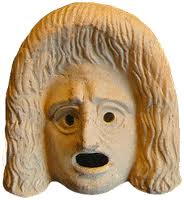Persona and Shadow
Returning to the subjective personal level, there is a scheme that Jung developed for classifying the aspects of ourselves encountered there when interpreting the dream. When we dream of figures having the same sex as we do, and if these figures are positive for us, they often refer to our persona or mask. This is that side of ourselves which we like to identify with. It often has a lot to do with the role(s) we perform in daily life (on the job, in the family, and so on). We can discover new talents and unknown parts of ourselves by paying attention to such dream figures.
If the same-sex figure is not so pleasing to our taste, however, then it quite likely represents an aspect of our shadow side, that part of ourselves which we would rather not know about or own as being present in our makeup. Very few people like to think of themselves as being cruel, stingy or abusive, for example. A lot of people are afraid of their negative emotions, including aggressive tendencies, rage and sorrow. These aspects of ourselves, though, can show up in our dreams in an enormous variety of guises and intensities. Here it may be advisable to distinguish between personal shadow qualities, which one needs to own, try to accept and integrate, and collective shadow which needs to be faced and confronted.
Next section List of sections List of chapters

